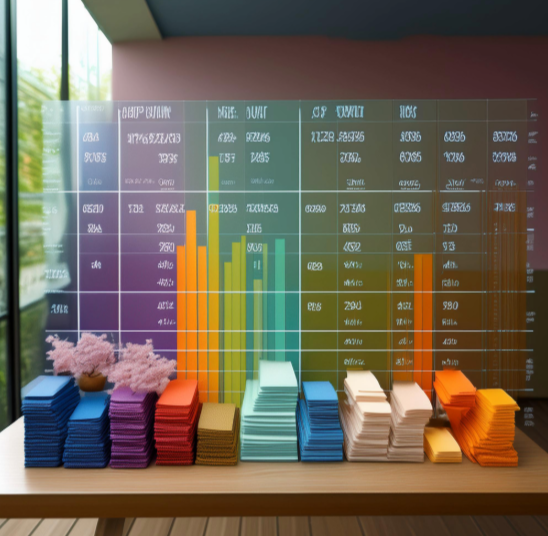Creating a personal budget is one of the most effective ways to take control of your finances. Whether you want to save for a vacation, pay off debt, or just keep better track of your spending, a budget can help you achieve your financial goals. Here’s a step-by-step guide to building a personal budget that works for you.

1. Understanding the Importance of a Personal Budget
A personal budget serves as a roadmap for your financial future. It allows you to:
- Track your income and expenses
- Set realistic savings goals
- Make informed spending decisions
- Avoid unnecessary debt
- Prepare for emergencies and future expenses
2. Assessing Your Financial Situation
Before you can create an effective budget, you need to understand where your money is going. Follow these steps:
Gather Financial Information
- Income Sources: List all sources of income, including salary, side hustles, and any passive income.
- Fixed Expenses: Note your fixed monthly expenses (e.g., rent/mortgage, utilities, insurance).
- Variable Expenses: Record your variable expenses (e.g., groceries, entertainment, dining out). Review bank statements or use expense tracking apps for accuracy.
Calculate Your Net Income
Subtract your total expenses from your income to see how much you have left over (or if you’re in the red).
3. Creating a Personalized Budget Plan
Now that you have a clear picture of your finances, it’s time to create your budget.
Choose a Budgeting Method
There are several methods you can choose from to structure your budget:
- Zero-Based Budgeting: Every dollar you earn is assigned a specific purpose (expenses, savings, debt repayment), leading to a net income of zero at the end of the month.
- 50/30/20 Rule: Allocate 50% of your income to needs, 30% to wants, and 20% to savings/debt repayment.
- Envelope System: Use physical envelopes for different categories of spending—once the money is gone from the envelope, no more spending in that category!
Set Realistic Goals
Determine what you want to achieve with your budget. These could include:
- Saving for a specific purchase
- Paying off credit card debt
- Building an emergency fund
Create Your Budget
You can create a budget using a spreadsheet, budgeting software, or a simple pen and paper. Make sure to include:
- Income sources
- Fixed and variable expenses
- Savings goals

4. Tips for Sticking to Your Budget
Creating a budget is just the first step—sticking to it is key. Here are some tips to help you stay on track:
- Track Your Spending: Regularly review your expenses against your budget. This will help you identify any areas where you might be overspending.
- Make Adjustments: Life changes, and so can your budget. Adjust your plan as needed to accommodate new expenses or changes in income.
- Stay Motivated: Remind yourself of your financial goals to keep your motivation high.
5. Recommendations for Budgeting Tools and Apps
Using budgeting tools can simplify the budgeting process. Here are some popular options:
- Mint: A free app that tracks spending, creates budgets, and shows your credit score.
- YNAB (You Need a Budget): A paid tool that emphasizes proactive budgeting and provides educational resources.
- EveryDollar: A user-friendly app that focuses on zero-based budgeting.
Building a personal budget may seem daunting at first, but with a little planning and commitment, it can become a valuable tool for achieving your financial goals. By assessing your financial situation, creating a personalized budget plan, and sticking to it, you’ll find yourself on the path to financial security. Start today and take control of your financial future! 💰💸 Ready to take your budgeting skills to the next level? Interact with our financial experts here for personalized advice and guidance! #PersonalBudgeting #FinancialGoals #TakeControlOfYourFinances #BudgetingTools.

6. Conclusion
🤑 Happy saving! 🎉 ️😊
The content provided here is for informational purposes only and does not constitute financial advice. Please consult a certified financial professional for personalized guidance.
Additional Tips for Building an Effective Budget
- Start with small, attainable goals: When creating a budget, it can be overwhelming to try and tackle all of your financial goals at once. Start with one or two achievable goals, such as paying off a credit card or saving for a specific item.
- Be honest with yourself: When tracking your expenses, it’s important to be honest about where your money is going. This will help you identify areas where you may be overspending and make adjustments accordingly.
- Don’t forget about irregular expenses: In addition to your fixed and variable expenses, there may be larger occasional expenses that need to be factored into your budget, such as car maintenance or annual subscriptions.
- Consider automation: If you struggle with sticking to a budget, consider automating some of your savings and bill payments. This can help you stay on track and avoid late fees or missed payments.
- Don’t be too strict: While it’s important to stick to your budget, don’t be too hard on yourself if you go over budget in a certain category. Allow for some flexibility and make adjustments as needed.
- Review and adjust regularly: Your budget should not be set in stone. Revisit it regularly (monthly or quarterly) and make adjustments as needed based on changes in your income or expenses.
- Involve your family/partner: If you have a joint budget with a spouse or partner, make sure to involve them in the process and communicate openly about financial goals and spending habits.
- Celebrate your successes: Don’t forget to celebrate when you achieve a financial goal or stick to your budget for a certain period of time. This can help keep you motivated and on track.

Bonus Tip: Seek Professional Help
If you feel overwhelmed or unsure about creating and managing a budget, don’t hesitate to seek professional help. A certified financial planner or advisor can provide personalized guidance and support based on your specific financial situation and goals. They can also help with long-term financial planning beyond just budgeting. Remember, investing in professional advice now could lead to greater financial stability and success in the future.
So start taking control of your finances today by using these tips and resources to build an effective budget. Remember, every small step towards your financial goals counts. Happy budgeting! 💰💸
The content provided here is for informational purposes only and does not constitute financial advice. Please consult a certified financial professional for personalized guidance.
Additional Tips for Building an Effective Budget
- Start with small, attainable goals: When creating a budget, it can be overwhelming to try and tackle all of your financial goals at once. Start with one or two achievable goals, such as paying off a credit card or saving for a specific item.
- Be honest with yourself: When tracking your expenses, it’s important to be honest about where your money is going. This will help you identify areas where you may be overspending and make adjustments accordingly.
- Don’t forget about irregular expenses: In addition to your fixed and variable expenses, there may be larger occasional expenses that need to be factored into your budget, such as car maintenance or annual subscriptions.
- Consider automation: If you struggle with sticking to a budget, consider automating some of your savings and bill payments. This can help you stay on track and avoid late fees or missed payments.
- Don’t be too strict: While it’s important to stick to your budget, don’t be too hard on yourself if you go over budget in a certain area.




